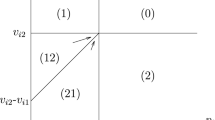Abstract
In this paper, we examine the problem of choosing discriminatory prices for customers with probabilistic valuations and a seller with indistinguishable copies of a good. We show that under certain assumptions this problem can be reduced to the continuous knapsack problem (CKP). We present a new fast ε-optimal algorithm for solving CKP instances with asymmetric concave reward functions. We also show that our algorithm can be extended beyond the CKP setting to handle pricing problems with overlapping goods (e.g.goods with common components or common resource requirements), rather than indistinguishable goods.
We provide a framework for learning distributions over customer valuations from historical data that are accurate and compatible with our CKP algorithm, and we validate our techniques with experiments on pricing instances derived from the Trading Agent Competition in Supply Chain Management (TAC SCM). Our results confirm that our algorithm converges to an ε-optimal solution more quickly in practice than an adaptation of a previously proposed greedy heuristic.
Preview
Unable to display preview. Download preview PDF.
Similar content being viewed by others
References
Benisch, M., et al.: Botticelli: A supply chain management agent. In: Proceedings of AAMAS ’04, New York, July 2004, pp. 1174–1181 (2004)
Case, K.E., Fair, R.C.: Principles of Economics, 5th edn. Prentice-Hall, Englewood Cliffs (1999)
Collins, J., et al.: The supply chain management game for the 2005 trading agent competition. Technical Report CMU-ISRI-04-139, Carnegie Mellon University (2005)
Etzioni, O., et al.: To buy or not to buy: mining airfare data to minimize ticket purchase price. In: Proceedings of KDD’03, pp. 119–128. ACM Press, New York (2003)
Ghani, R.: Price prediction and insurance for online auctions. In: Proceedigns of KDD’05, pp. 411–418. ACM Press, New York (2005)
Kellerer, H., Pferschy, U., Pisinger, D.: Knapsack Problems. Springer, Heidelberg (2004)
Lawrence, D.: A machine-learning approach to optimal bid pricing. In: Proceedings of INFORMS’03 (2003)
Melman, A., Rabinowitz, G.: An efficient method for a class of continuous knapsack problems. Society for Industrial and Applied Mathematics Review 42(3), 440–448 (2000)
Pardoe, D., Stone, P.: Bidding for customer orders in TAC SCM. In: Proceedings of AAMAS-04 Workshop on Agent-Mediated Electronic Commerce (2004)
Quinlan, J.R.: Learning with Continuous Classes. In: 5th Australian Joint Conference on Artificial Intelligence, pp. 343–348 (1992)
Robinson, A.G., Jiang, N., Lerme, C.S.: On the continuous quadratic knapsack problem. Math. Program. 55(1-6), 99–108 (1992)
Sandholm, T., Suri, S.: Market clearability. In: Proceedings of IJCAI’01, pp. 1145–1151 (2001)
Author information
Authors and Affiliations
Editor information
Rights and permissions
Copyright information
© 2007 Springer Berlin Heidelberg
About this paper
Cite this paper
Benisch, M., Andrews, J., Sadeh, N. (2007). Adaptive Pricing for Customers with Probabilistic Valuations. In: Fasli, M., Shehory, O. (eds) Agent-Mediated Electronic Commerce. Automated Negotiation and Strategy Design for Electronic Markets. TADA AMEC 2006 2006. Lecture Notes in Computer Science(), vol 4452. Springer, Berlin, Heidelberg. https://doi.org/10.1007/978-3-540-72502-2_10
Download citation
DOI: https://doi.org/10.1007/978-3-540-72502-2_10
Publisher Name: Springer, Berlin, Heidelberg
Print ISBN: 978-3-540-72501-5
Online ISBN: 978-3-540-72502-2
eBook Packages: Computer ScienceComputer Science (R0)




